外研版必修1 Module 1 My First Day at Senior High Pronunciation, Speaking, Writing课件(42张ppt)
文档属性
| 名称 | 外研版必修1 Module 1 My First Day at Senior High Pronunciation, Speaking, Writing课件(42张ppt) | 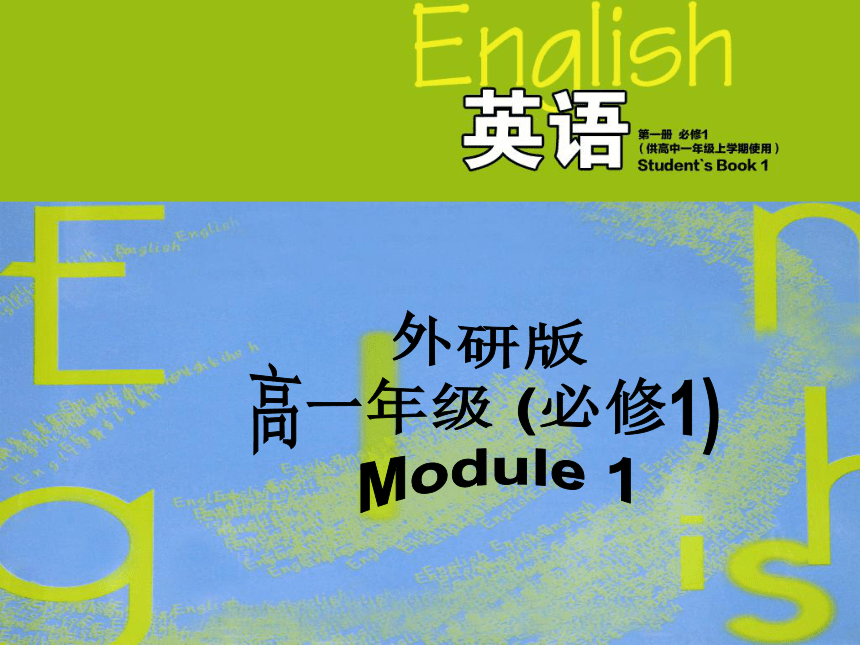 | |
| 格式 | zip | ||
| 文件大小 | 3.0MB | ||
| 资源类型 | 教案 | ||
| 版本资源 | 外研版 | ||
| 科目 | 英语 | ||
| 更新时间 | 2022-01-25 15:58:43 | ||
图片预览

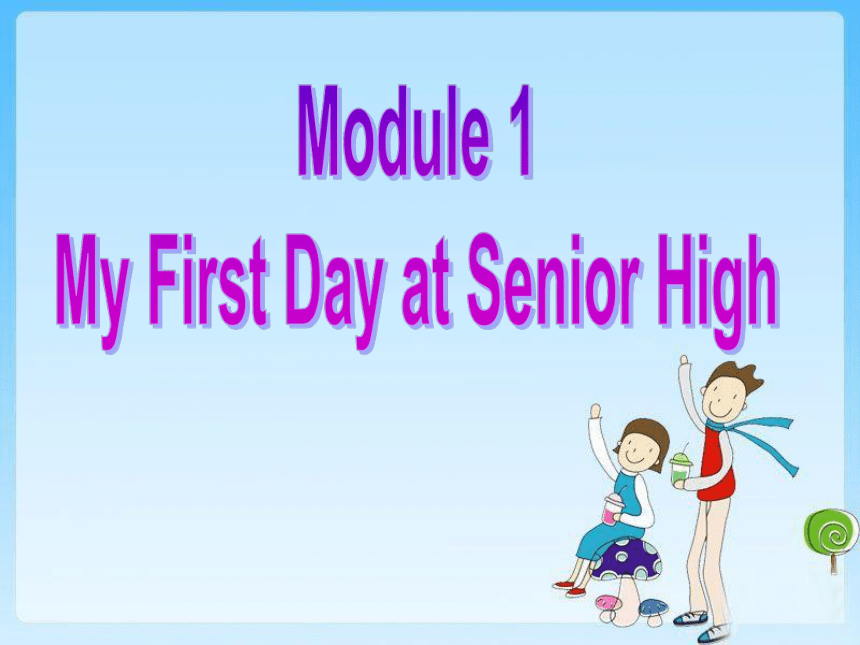

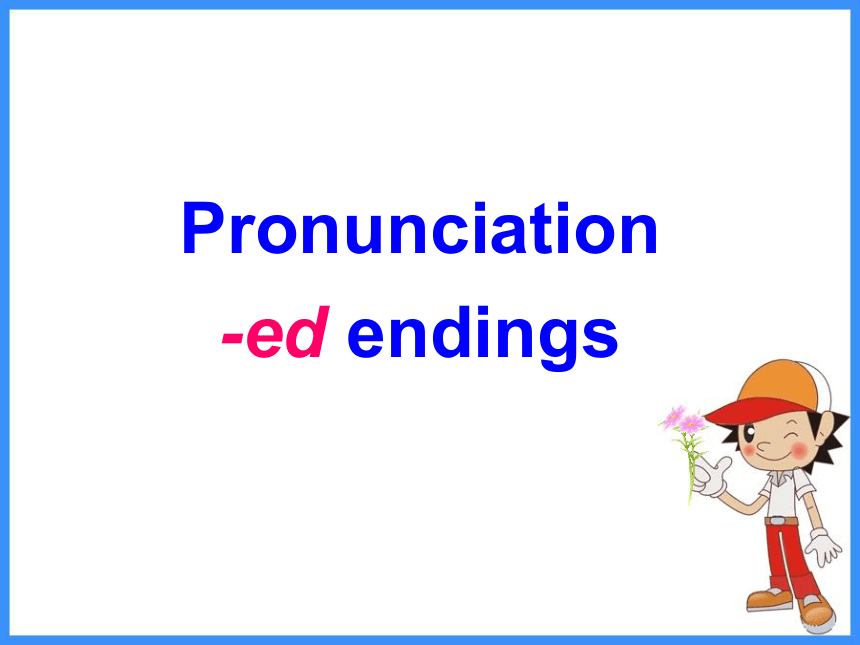

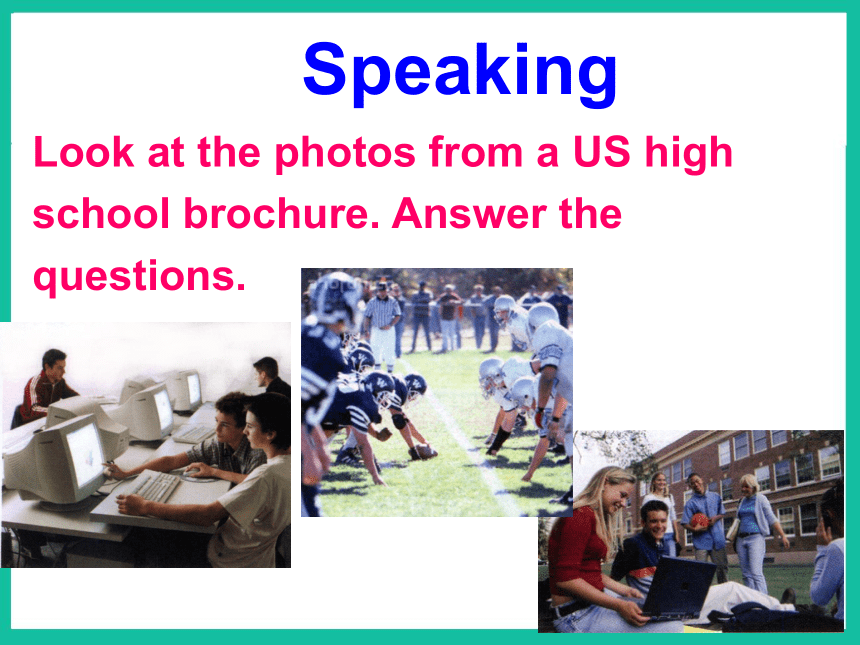
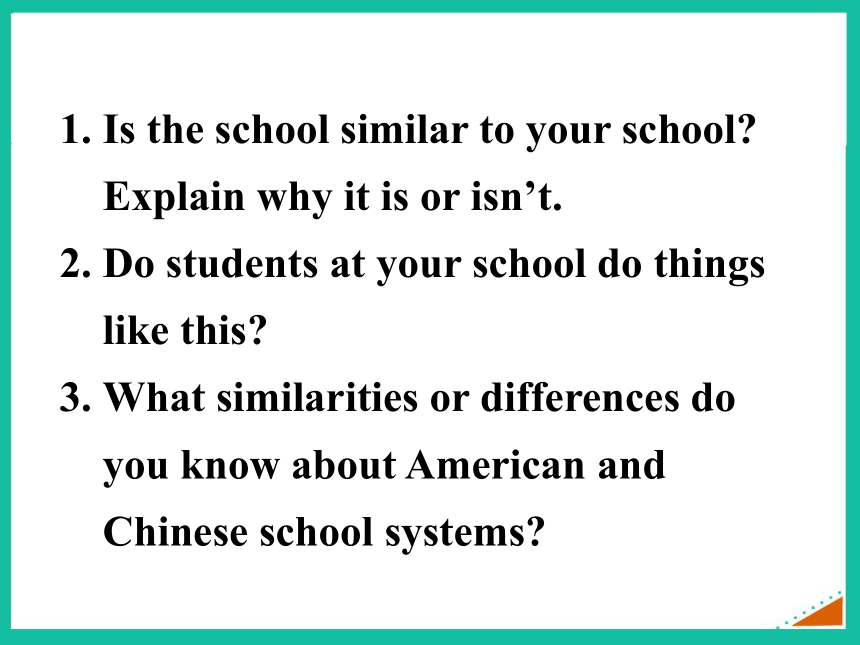



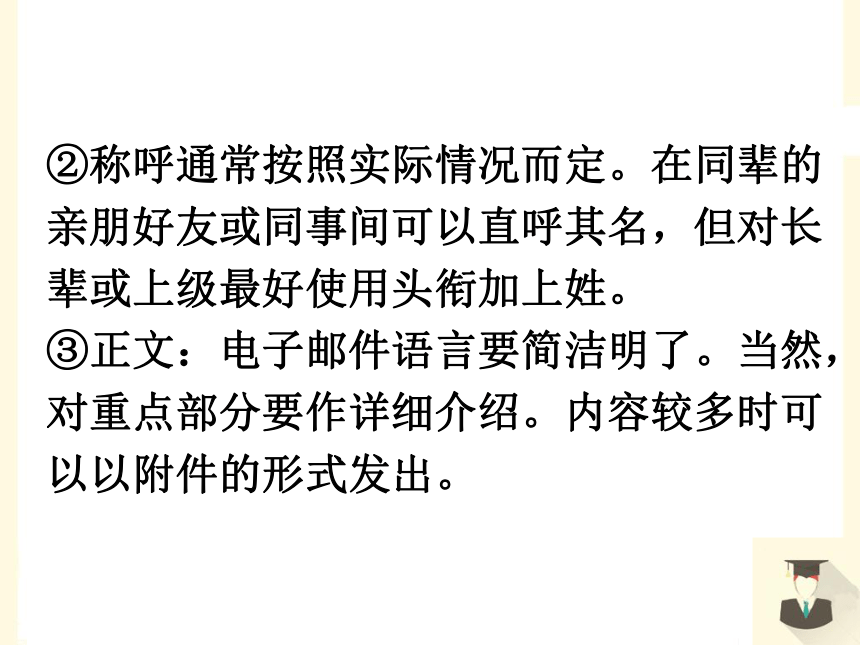
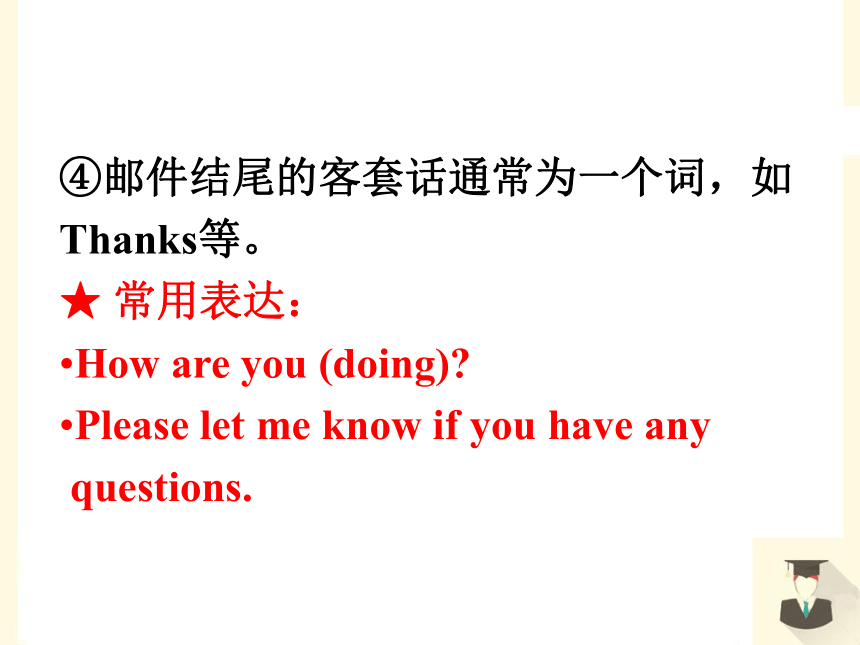
文档简介
(共42张PPT)
Review
Complete the sentences.
1. He isn’t Chinese, but he’s _____ in
Chinese.
2. The first lesson was very ________ ─ I liked it a lot!
3. I was a bit disappointed ─she ___________ everything in English.
fluent
enjoyable
explained
Pronunciation
-ed endings
Listen to the pronunciation of these words. What is different about the pronunciation of the ends of the words in the different groups
1 amazed bored tired
2 embarrassed
3 disappointed excited interested
Speaking
Look at the photos from a US high school brochure. Answer the questions.
Is the school similar to your school Explain why it is or isn’t.
Do students at your school do things like this
What similarities or differences do you know about American and Chinese school systems
We can send our best
wishes to our friends
by email.
Email is bridging
the distance between
people.
写作指导
1. 审题与定调
本文的格式为电子邮件,其格式为:
① 在“收件人(To)”框中输入收信人的email 地址,如Peter2016@。
“主题(Subject)”框最好不要空着,可以用一个单词、一个短语或一个完整的句子来概述邮件内容。
②称呼通常按照实际情况而定。在同辈的亲朋好友或同事间可以直呼其名,但对长辈或上级最好使用头衔加上姓。
③正文:电子邮件语言要简洁明了。当然,对重点部分要作详细介绍。内容较多时可以以附件的形式发出。
④邮件结尾的客套话通常为一个词,如Thanks等。
★ 常用表达:
How are you (doing)
Please let me know if you have any
questions.
If you agree with me, please write a letter to me or phone me. My telephone number / My address / My email address is ...
Thanks for the information / your attention!
Hope you have a good trip.
I expect to hear from you soon.
1. Who is writing the email
Martha, a 16-year-old girl from New York.
2. Why is she writing
She wants students to tell her about their memories of their first year at primary school.
Read the email from an American student and answer the question.
3. What does she remember
The smell of wall paint; Molly, her friend; Miss Sharp’s smile; her favorite activity: drawing pictures.
Hello, my name is Martha,
I’m ___ years old and live
in _________. I’m in _____ grade in Senior High school. My favorite subjects are ______ and _______. I’m also studying _______ in the evening class.
Main idea of the passage:
New York
tenth
history
Spanish
Chinese
Martha’s self-introduction.
16
What is the main idea of Paragraph 2
Martha has some questions about Li Kang’s memories of his first year at school.
What is the main idea of Paragraph 3
Martha’s memories about her first year at school.
Write a reply, answering the questions in the email.
Sample:
A:What is your first memory of school
B: My first memory of school was the smell of paint.
A: What was your favorite activity when you were in first grade
B: My favorite activity in first grade was drawing pictures.
A: What can you remember about your first teacher
B: My first teacher was called Miss Sharp and she had the biggest smile in the world.
A: Who was your first best friend Is she still your best friend
B: My first best friend was a girl called Molly and we were friends for about three years. But then she moved to California. She still write to me.
1. in the evening class 在上夜校
2. Would you mind answering the questions for me
你介意回答我的问题吗?
Would you mind doing …
你介意做……吗
e.g.
_________________________the door
我关门你介意吗?
_____________________me a piece of
paper
请给我一张纸好吗?
Do you mind my/me shutting
Would you mind giving
No, I don’t mind. 我不介意(不反对)。
No, go ahead. 我不在乎,请吧!
Of course not. 当然不反对。
Not at all. Please do.
一点也不介意,请吧!
如果表示“不愿意”, 则用I’m sorry, but…
如果表示“愿意”,应该说:
3. at the start of the the year在本学年初
start为名词, 意为“(工作等的)开始,着手,最初,最初部分 ”。
e.g. If we don’t hurry, we’ll miss the
_______________.
要是不快走,我们就赶不上比赛的
开头了。
_______________________________
从头就一切顺利。
start of the game
Everything went well from the start.
at the start 起初;最先
from start to finish 从头到尾
give a start (of …)
(因……而) 吃一惊,吓一跳
give …a start
使……吃惊;使……吓一跳
make a start 出发;起跑
e.g. He ________________in the game.
他在比赛中取得了一个好的开局。
made a good start
4. My favorite activity in first grade was
drawing pictures.
drawing pictures在句中作表语,说
明主语的内容。
5. She had the biggest smile in the world.
have the biggest smile笑容满面,灿
烂的笑容
熟悉e-mail写作,介绍美丽校园
假设你叫李华,作为一名高一新生,你对新学校的一切都感到新鲜和好奇。请根据下面提示以及图画给你的美国网友Peter发一封电子邮件,向他描述你在新高中第一天的所见、所闻及所想。
要点如下:
校园位置:位于山脚下,它后面有一个公园;校门前有一条宽敞的街道直通商业区(business district)。
校园内:中心有一个喷泉(fountain)和一面国旗,教学楼和多媒体教室(multimedia classroom)引人注目,到处是花,树木成荫。
师生情况:老师和学生都很友好。
整体感受:……
注意:1. 词数:100左右; 2. 文章开头和结尾已经给出,不计入总词数; 3. 可适当增加细节,以使行文连贯。
发件人:Lihua@
收件人:Peter@
主题: my first day at senior high
添加附件
内容:
Dear Peter,
How are you I want to tell you something about my first day at senior high.
...
Best wishes!
Yours,
Li Hua
写作方法为记叙加描写的形式。介绍学校时可按由外到内、由远到近的空间顺序描写,如:学校外部环境———校园内的布局(校园环境———教学设施)。
时态的运用:记叙当天的情况时用一般过去时。描写学校外围及内部布局,老师和学生的情况以及作者的总体感受时,可转入现在时态。
审定篇章结构
全文可分三段。
第一段:学校的位置及周边环境。
第二段:校园内的布局及师生情况。
第三段:我的整体感受。
Read this part of the conversation between Rob and Diane. Look for the expressions they use to keep the conversation going.
Rob: Hi, Diane!
Diane: Hi, Rob! How are you doing
Rob: I’m fine. I’ve just been to my first language class.
Diane: Oh really So have I . Which language are you studying
Rob: Chinese.
Diane: Is that right Cool! How was it
Rob: There’s an assistant teacher
called Miss Wang. She’s
Chinese. We’re going to see her
once a week.
Diane: And what do you think…
1. How are you doing 你的情况怎么样啊?
do 用作不及物动词, 表示“进展, 进行”。
e.g. The patient is __________
病人情况良好。
His business ________. 他的事业顺利。
do常与will, won’t 连用, 意为“适当;管用; 行”。
doing well.
did well
e.g. Any magazine ________.
任何杂志都可以。
Those shoes _________for climbing.
那双鞋不适合登山。
will do
won’t do
2. So have I. 我也去过。
“so +助动词/情态动词/系动词+主语”,表示前面所说的情况也适合于另一个人或物。
e.g. He is an artist, ________.
他是艺术家,她也是。
so is she
Tom is a college student, ________.
汤姆是大学生,我也是。
Nancy can play the violin, ________.
南希会拉小提琴,我也会。
“I saw the movie.” “________.”
“我看过那部电影。” “我也看了。”
so am I
so can I
So did I
Preview
Preview CULTURAL CORNER and find
out the similarities and differences of the
American and Chinese school systems.
Prepare a conversation with your partner use the expressions that keep the conversation going.
Review
Complete the sentences.
1. He isn’t Chinese, but he’s _____ in
Chinese.
2. The first lesson was very ________ ─ I liked it a lot!
3. I was a bit disappointed ─she ___________ everything in English.
fluent
enjoyable
explained
Pronunciation
-ed endings
Listen to the pronunciation of these words. What is different about the pronunciation of the ends of the words in the different groups
1 amazed bored tired
2 embarrassed
3 disappointed excited interested
Speaking
Look at the photos from a US high school brochure. Answer the questions.
Is the school similar to your school Explain why it is or isn’t.
Do students at your school do things like this
What similarities or differences do you know about American and Chinese school systems
We can send our best
wishes to our friends
by email.
Email is bridging
the distance between
people.
写作指导
1. 审题与定调
本文的格式为电子邮件,其格式为:
① 在“收件人(To)”框中输入收信人的email 地址,如Peter2016@。
“主题(Subject)”框最好不要空着,可以用一个单词、一个短语或一个完整的句子来概述邮件内容。
②称呼通常按照实际情况而定。在同辈的亲朋好友或同事间可以直呼其名,但对长辈或上级最好使用头衔加上姓。
③正文:电子邮件语言要简洁明了。当然,对重点部分要作详细介绍。内容较多时可以以附件的形式发出。
④邮件结尾的客套话通常为一个词,如Thanks等。
★ 常用表达:
How are you (doing)
Please let me know if you have any
questions.
If you agree with me, please write a letter to me or phone me. My telephone number / My address / My email address is ...
Thanks for the information / your attention!
Hope you have a good trip.
I expect to hear from you soon.
1. Who is writing the email
Martha, a 16-year-old girl from New York.
2. Why is she writing
She wants students to tell her about their memories of their first year at primary school.
Read the email from an American student and answer the question.
3. What does she remember
The smell of wall paint; Molly, her friend; Miss Sharp’s smile; her favorite activity: drawing pictures.
Hello, my name is Martha,
I’m ___ years old and live
in _________. I’m in _____ grade in Senior High school. My favorite subjects are ______ and _______. I’m also studying _______ in the evening class.
Main idea of the passage:
New York
tenth
history
Spanish
Chinese
Martha’s self-introduction.
16
What is the main idea of Paragraph 2
Martha has some questions about Li Kang’s memories of his first year at school.
What is the main idea of Paragraph 3
Martha’s memories about her first year at school.
Write a reply, answering the questions in the email.
Sample:
A:What is your first memory of school
B: My first memory of school was the smell of paint.
A: What was your favorite activity when you were in first grade
B: My favorite activity in first grade was drawing pictures.
A: What can you remember about your first teacher
B: My first teacher was called Miss Sharp and she had the biggest smile in the world.
A: Who was your first best friend Is she still your best friend
B: My first best friend was a girl called Molly and we were friends for about three years. But then she moved to California. She still write to me.
1. in the evening class 在上夜校
2. Would you mind answering the questions for me
你介意回答我的问题吗?
Would you mind doing …
你介意做……吗
e.g.
_________________________the door
我关门你介意吗?
_____________________me a piece of
paper
请给我一张纸好吗?
Do you mind my/me shutting
Would you mind giving
No, I don’t mind. 我不介意(不反对)。
No, go ahead. 我不在乎,请吧!
Of course not. 当然不反对。
Not at all. Please do.
一点也不介意,请吧!
如果表示“不愿意”, 则用I’m sorry, but…
如果表示“愿意”,应该说:
3. at the start of the the year在本学年初
start为名词, 意为“(工作等的)开始,着手,最初,最初部分 ”。
e.g. If we don’t hurry, we’ll miss the
_______________.
要是不快走,我们就赶不上比赛的
开头了。
_______________________________
从头就一切顺利。
start of the game
Everything went well from the start.
at the start 起初;最先
from start to finish 从头到尾
give a start (of …)
(因……而) 吃一惊,吓一跳
give …a start
使……吃惊;使……吓一跳
make a start 出发;起跑
e.g. He ________________in the game.
他在比赛中取得了一个好的开局。
made a good start
4. My favorite activity in first grade was
drawing pictures.
drawing pictures在句中作表语,说
明主语的内容。
5. She had the biggest smile in the world.
have the biggest smile笑容满面,灿
烂的笑容
熟悉e-mail写作,介绍美丽校园
假设你叫李华,作为一名高一新生,你对新学校的一切都感到新鲜和好奇。请根据下面提示以及图画给你的美国网友Peter发一封电子邮件,向他描述你在新高中第一天的所见、所闻及所想。
要点如下:
校园位置:位于山脚下,它后面有一个公园;校门前有一条宽敞的街道直通商业区(business district)。
校园内:中心有一个喷泉(fountain)和一面国旗,教学楼和多媒体教室(multimedia classroom)引人注目,到处是花,树木成荫。
师生情况:老师和学生都很友好。
整体感受:……
注意:1. 词数:100左右; 2. 文章开头和结尾已经给出,不计入总词数; 3. 可适当增加细节,以使行文连贯。
发件人:Lihua@
收件人:Peter@
主题: my first day at senior high
添加附件
内容:
Dear Peter,
How are you I want to tell you something about my first day at senior high.
...
Best wishes!
Yours,
Li Hua
写作方法为记叙加描写的形式。介绍学校时可按由外到内、由远到近的空间顺序描写,如:学校外部环境———校园内的布局(校园环境———教学设施)。
时态的运用:记叙当天的情况时用一般过去时。描写学校外围及内部布局,老师和学生的情况以及作者的总体感受时,可转入现在时态。
审定篇章结构
全文可分三段。
第一段:学校的位置及周边环境。
第二段:校园内的布局及师生情况。
第三段:我的整体感受。
Read this part of the conversation between Rob and Diane. Look for the expressions they use to keep the conversation going.
Rob: Hi, Diane!
Diane: Hi, Rob! How are you doing
Rob: I’m fine. I’ve just been to my first language class.
Diane: Oh really So have I . Which language are you studying
Rob: Chinese.
Diane: Is that right Cool! How was it
Rob: There’s an assistant teacher
called Miss Wang. She’s
Chinese. We’re going to see her
once a week.
Diane: And what do you think…
1. How are you doing 你的情况怎么样啊?
do 用作不及物动词, 表示“进展, 进行”。
e.g. The patient is __________
病人情况良好。
His business ________. 他的事业顺利。
do常与will, won’t 连用, 意为“适当;管用; 行”。
doing well.
did well
e.g. Any magazine ________.
任何杂志都可以。
Those shoes _________for climbing.
那双鞋不适合登山。
will do
won’t do
2. So have I. 我也去过。
“so +助动词/情态动词/系动词+主语”,表示前面所说的情况也适合于另一个人或物。
e.g. He is an artist, ________.
他是艺术家,她也是。
so is she
Tom is a college student, ________.
汤姆是大学生,我也是。
Nancy can play the violin, ________.
南希会拉小提琴,我也会。
“I saw the movie.” “________.”
“我看过那部电影。” “我也看了。”
so am I
so can I
So did I
Preview
Preview CULTURAL CORNER and find
out the similarities and differences of the
American and Chinese school systems.
Prepare a conversation with your partner use the expressions that keep the conversation going.
